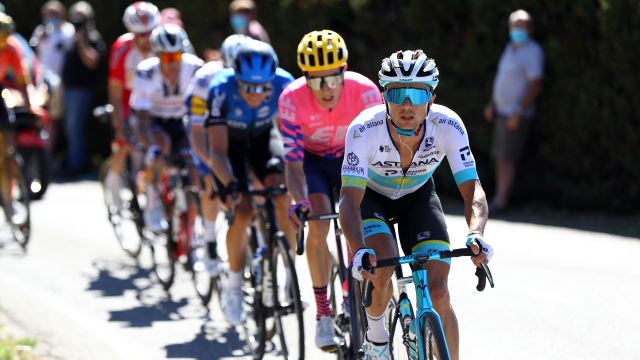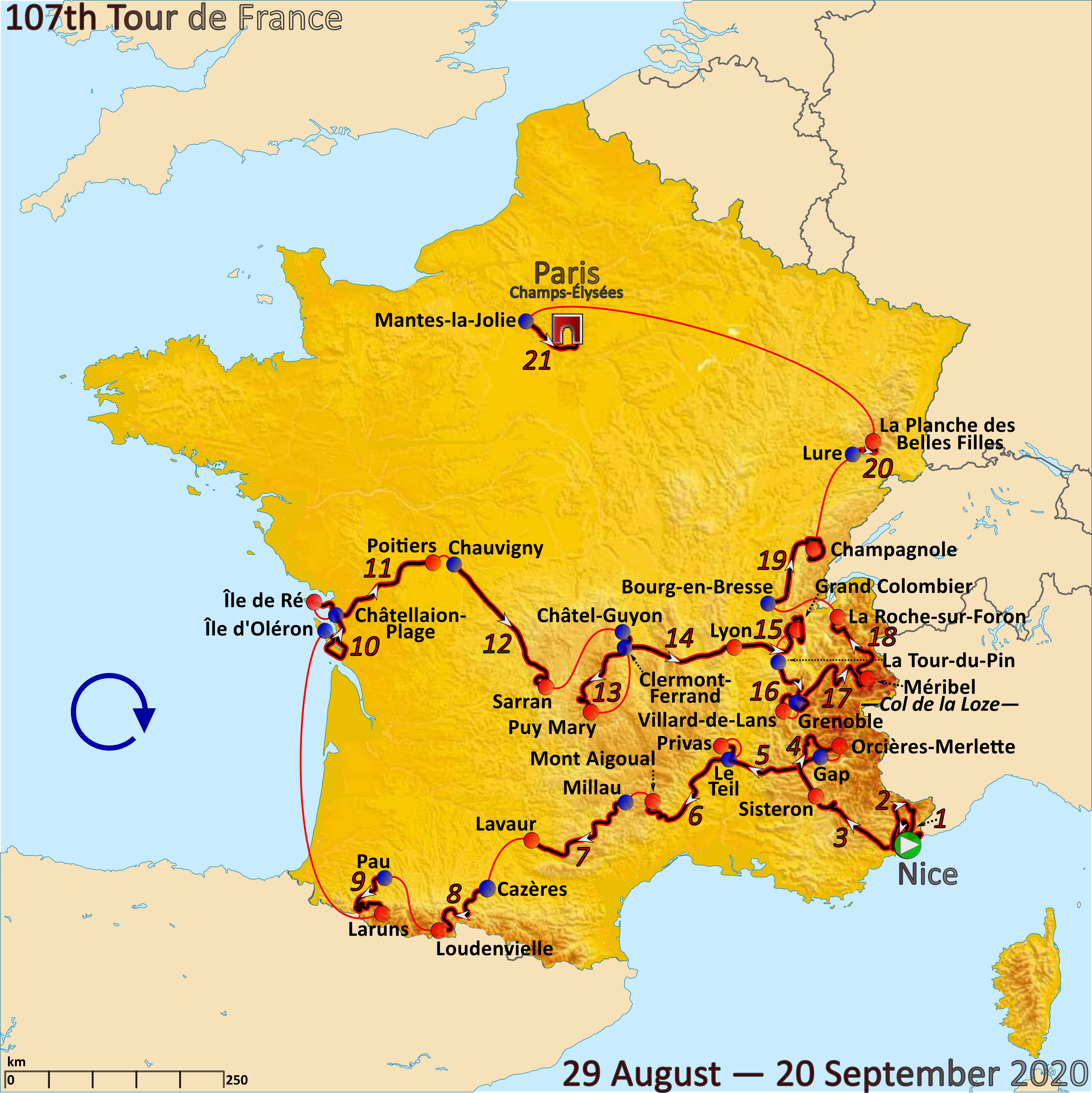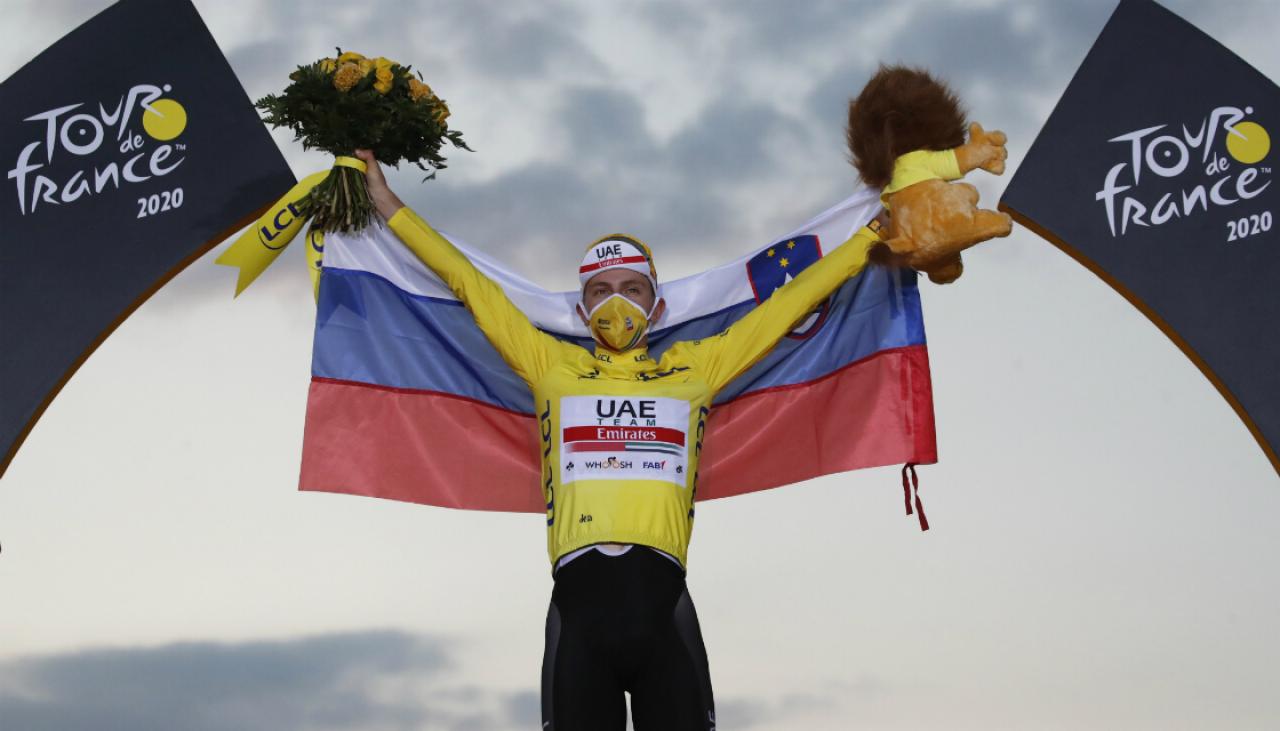Who Will Win Tour De France 2020
So. The Tour de France then.
Any questions?
There’s a Tour de France this year?
Tadej Pogacar became the first Slovenian to win the Tour de France after he retained the yellow jersey in the 21st stage on Sunday, a day after he pulled off a major coup to take the overall lead. Imminent departure for the 2020 edition of the Tour de France. From Saturday, August 29 and for three weeks, the runners will compete on the roads and in the passes of France to seize the yellow jersey of best runner.
Yes.
Are they actually going to make it all the way to the finish?
Well, now you’re asking. Not sure I’d put big money on it happening, but let’s see.
The Tour is, by necessity, the most adaptable major sporting event of all, seemingly altering both its route and rules on the fly. It’ll probably need a good dose of that if it’s to make it all the way to Paris.
One major rule that could see the whole thing come tumbling down is that if two riders from the same team return positive coronavirus tests, all their team mates also have to leave the race.
Who will win?
Obvious provisos here (see above) but “the script” at the outset goes something like this…
Primoz Roglic is in form and always seems to start Grand Tours strongly. There’s a good chance he’ll be the best rider for the first half of the race, but then start to fade. From that point, it’ll all hinge on whether he has enough of an advantage over last year’s winner, Egan Bernal, to make it to the finish in yellow.
It almost certainly won’t go like that, but if you’re scrabbling for a toehold so that you can try and understand this year’s race, that’s a decent starting point. (If it does pan out like this, watch out for everyone completely forgetting how three-week races work and anointing the Slovenian the inevitable winner halfway through the first week.)

Who else might win?
This is a far more interesting question because the weird build-up to this year’s race encourages the idea we could get a slightly unexpected winner.
That said, the strength of Bernal’s team, Ineos Grenadiers, and Roglic’s Jumbo-Visma means that the second favourites arguably come from those same two teams.
Last year’s Giro d’Italia winner Richard Carapaz was a late call-up for Ineos after Chris Froome and Geraint Thomas proved themselves insufficiently fast at cycling to warrant selection. In theory, Carapaz was aiming to peak for next month’s Giro, but the season’s so congested he’s probably in decent shape.
Meanwhile Roglic’s team-mate Tom Dumoulin didn’t look marvellous at the Criterium du Dauphine a couple of weeks back, but then he’d barely raced in a year or so and is getting back into it. He tends to be a major contender in three week races and has been known to win one.
The riders who did better than Dumoulin at the Dauphine included some familiar names who should do well at the Tour, plus a couple of unfamiliar ones.
The big French hopes Thibaut Pinot and Romain Bardet are the most obvious. There’s a whiff of bridesmaidery about these two so I can definitely see one or the other or possibly both on the podium (or abandoning late on in floods of tears).
Tadej Pogacar – another Slovenian – is only 21 but somehow finished third in the Vuelta a Espana last year. Presumably even he doesn’t know how good he is at this point but he’s definitely worth watching.
Colombian rider Miguel Angel Lopez is another promising young rider who we should see a lot of, but then he has been around a while now and always seems just a notch off the pace. I’ve mentally categorised him a high profile also-ran along with the Basque rider, Mikel Landa.

The other two riders to do well at the Dauphiné were Daniel Martinez, the young Colombian who won the race and who is therefore obviously someone to watch, and Guillaume Martin, who can’t possibly be worth watching simply because he rides for Cofidis, a team whose biggest contribution to the Tour de France is being French.
Other riders to keep an eye on include Nairo Quintana, on a new team and hoping to return to flirting with glory again; Emanuel Buchmann, a promising young German; good old Rigoberto Uran; and maybe Jakob Fuglsang who has been around a while now but is good and has won a big climbing race this year.
Disappointingly, it looks like neither Julian Alaphilippe nor Adam Yates will be contesting the overall but will instead be looking to win individual stages. This would be a real shame as Alaphilippe basically made the race last year while Yates could offer British interest with Froome and Thomas not racing. (Not entirely coincidentally, Yates is moving to Ineos for next season.)
What’s this year’s route like?
Lots of climbing.
I mean just look at the map.
If you know France, you’ll immediately see that we’ll be hanging out in the bumpy bits for the most part.
What’s the first week of the race like?
Unusually hard.
The Tour usually eases in with a series of flat stages, perhaps with the odd small hill somewhere near the finish.
This year Stage 1 in Nice is bumpy and Stage 2, which also finishes in Nice, is basically a full-on mountain stage with two proper 15km climbs.
Those take place on Saturday and Sunday, while Stage 3 on Monday brings a rolling stage through the Var. There are no monster climbs, but I’ve ridden this area a fair bit and even if they’re dodging the toughest stuff, I don’t reckon all the sprinters will be in the front group to contest the finish (although the last 50-60km are a lot easier).
Stage 4 (on Tuesday) is, somewhat unexpectedly, a summit finish. (What is this? The Vuelta?) It’s not a hard one, but there will be time gaps between the favourites.
Stage 5 is a sprint day.
Stage 6 (Thursday) is another summit finish atop Mont Aigoual.
Stage 7 looks like another sprint day.
Stage 8 (Saturday) is a shortish (and therefore more intense) day in the Pyrenees with the first ‘beyond categorisation’ climb of the race, the Port de Bales. (It’s not actually much harder than some of the previous climbs. Maybe a bit more irregular.)
Stage 9 (Sunday) brings the first “week” of racing to a close. The final climb, the Col de Marie Blanque, is apparently quite steep near the top and obviously everyone’s pretty knackered by now, so it should be a colourful finish.
How can I follow the race?
TV coverage on ITV4 and Eurosport, as I reported yesterday.
You should also definitely, definitely, definitely sign up to receive my weekly recaps by email.
Similar rides from the past:
Israel Start-Up Nation is maintaining its unerring faith in Chris Froome and his Tour de France dream.
“I think we’ve got to believe [in Froome], haven’t we?” team sport director Cherie Pridham said this week.

Froome heads up a big-budget, ambitious Israeli squad in 2021 in what marks a pivotal season in his career. Still on the comeback from a shopping-list of serious injuries and in his first season with a newly bolstered squad, Froome is all-in for targeting a fifth Tour de France, and team backer Sylvan Adams wants to see him do it this summer.
It’s now been nearly three years since Froome last won a grand tour at the 2018 Giro d’Italia, but the team believes that the elusive fifth yellow jersey is still in his grasp.
“Why not? It’s one of the instrumental reasons why we brought him on board, you know, to give that a go,” Pridham told the Eurosport podcast this week.
“[Given] the extent of the injuries that Chris has had to deal with, and the recuperation and rehab that he’s had to go through, we spent a lot of time as a team making sure that Chris’ rehab has been where we need it to be,” she said. “Although he might be a little bit behind in where we need to be, with Chris, every day at UAE he was feeling better and better.”

Froome had an inauspicious start to the final phase of his career at the UAE Tour last month, increasing the speculation about his ability to return to his former glories.

The 35-year-old was left swinging in the echelons of the opening stage in the Emirates and absent in the first mountaintop finish. The highpoint of his week was a ride deep into the second climbing test on Jebel Jais in support of teammate Ben Hermans.
After dropping out of the lead group with 4km to go and finishing several minutes back, Froome spoke of his optimism in his growing form.
The race had marked Froome’s first competition after spending countless hours of his off-season rehabilitating his leg at the Red Bull High-Performance Center in California. By February, the data suggested his shattered hip and femur was nearly back to the level it should be, and Froome and his team was buoyed by the progress.
“We’re a long way out still in terms of thinking about the Tour de France, but we are building in the background and I think from what I’ve seen and heard from his coaches, and from the performance team, he’s on track,” Pridham said. “Mainly and most importantly, he’s recovering – his rehab is almost 99 percent done.”
Who Is The Winner Of Tour De France 2020
Froome has got the team, he’s got the ambition, he’s got the backing. Now he needs to start showing some results.
Who Will Win Tour De France 2020
Froome is next set to race at the Volta a Catalunya later this month. From there, all roads lead to Paris.